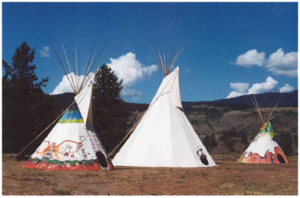Teepee maker preserving and sharing traditional knowledge

By Rick Garrick
VANCOUVER — Mukwa Teepees owner Tony Solomon’s career began after choosing his father Art Solomon’s teepee from his belongings after he passed in the late 1990s.
“After my father and mother passed away, my siblings and I were sitting in a circle deciding what to do with their belongings,” Solomon says. “I said to the group, ‘I don’t know what to ask for, I don’t know what’s left’ and literally, I heard a man’s voice over my right shoulder that said: ‘Ask for his teepee.’”
Solomon says his youngest sister then said she had wished she had thought of the teepee, so they decided to give the teepee to the Midewiwin who had done the funerals for their parents. But later in October and again the following January, Solomon began waking up to the feeling that he needed a teepee.
“So after about a month, I gave into those feelings and I decided to make a teepee,” Solomon says, noting that he found a company to stitch up some canvas fabric he had cut into basically the design his father had, dreamed about how to put up the teepee poles like his father had done, gathered some poles and went camping with the teepee at a provincial park. “We set up the teepee according to the instructions I had received in this dream, and in 15 minutes we were sitting inside the teepee and had a fire going inside there.”
Solomon says he made another teepee with some modifications the next year and over that summer had offers from various people to purchase his teepee and to build teepee for a campground that had damaged teepee from a tornado in Washington state.
“The following year, the rumour was around Vancouver that I was making teepee and I had teepees,” Solomon says. “I was asked to rent some teepee to the national Aboriginal week at the Vancouver Art Gallery and that way I became known in B.C. and elsewhere that I was making teepees.”
Solomon says his business has since grown from there.
“I never did any advertising but I believed what I was taught by my parents [that] if you’re going to do something, do it well or don’t do it at all,” Solomon says. “So my belief with making the teepees was to do quality and to this day, I’ve had a money-back guarantee in my business that you will not find a better quality teepee anywhere in the world.”
Solomon says he shipped out about 19-20 teepees and a couple of wigwams across the country this past August, and also travelled across the country to teach clients how to set up and use the teepee effectively as well as some of the history and technology of the teepee.
“For some, they want to learn about the spiritual aspect of life and the spiritual aspect of the teepee and how that fits into the Anishinabek philosophy that I was raised by,” Solomon says. “Part of my responsibility, and actually this is what my main work is about, is sharing that knowledge, and the teepee is the medium I was given to use as the tool to deliver the messages.”
Solomon says he delivered a repaired teepee to former National Chief Phil Fontaine, did a workshop in Manitoba for two clients he had shipped teepees to and delivered nine 22-foot teepees to a client in Kenora during August.
“A client in southern Ontario here [wants] a workshop also,” Solomon says during a stop in Orillia. “From here, I go to Kitigan Zibi in Quebec. I have a friend there who makes birch bark canoes and birch bark wigwams there, and I made a teepee for him that I need to drop off.”
Solomon says he is also delivering teepees to communities in New Brunswick, Nova Scotia and Newfoundland.

